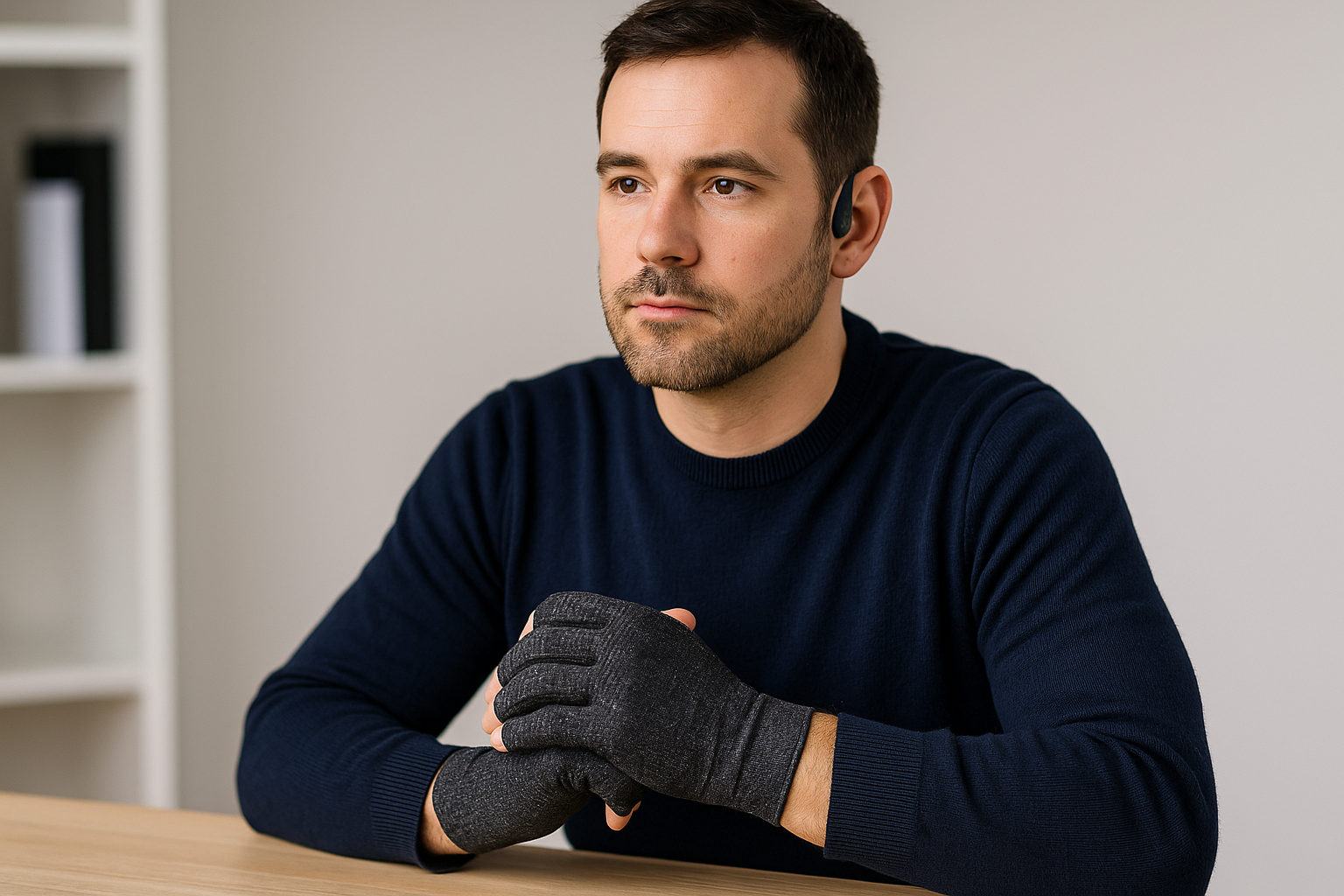Compression gloves are widely praised for their ability to improve circulation, reduce stiffness, and provide relief from conditions like arthritis, Raynaud’s disease, or cold hands. They are generally safe, comfortable, and non-invasive. However, like any therapeutic accessory, there are situations where wearing them may not be appropriate or effective. Knowing when not to wear compression gloves is just as important as understanding their benefits, to ensure safe and beneficial use.
In this article, we’ll explore the cases where compression gloves should be avoided, when to take extra precautions, and how to use them responsibly.
What situations make compression gloves unsuitable?
Compression gloves are often recommended for people dealing with arthritis, Raynaud’s syndrome, or chronic cold hands. They provide gentle pressure to stimulate circulation, reduce stiffness, and keep hands warmer. While they are generally safe and non-invasive, there are still situations where their use may be unsuitable or even counterproductive. Understanding these cases helps you use compression gloves wisely and avoid discomfort or potential health issues.
When the gloves are the wrong size
One of the most common situations that makes compression gloves unsuitable is when they are too tight or too loose. Gloves that fit too tightly may restrict blood flow instead of improving it, leading to tingling, numbness, or even swelling. Conversely, gloves that are too loose will not provide the therapeutic compression required, making them ineffective.
Choosing the right size is crucial. Always measure your hands according to the manufacturer’s sizing chart, and replace worn-out gloves that no longer maintain proper elasticity.
In case of severe circulation problems
Although compression gloves are designed to improve circulation, they may not be suitable for people with severe vascular conditions. For example, individuals with advanced peripheral artery disease or severe diabetes-related circulation problems should seek medical advice before using them.
In some cases, compression may place additional strain on already compromised blood vessels, causing more harm than good. A doctor can confirm whether these gloves are appropriate or if alternative treatments are safer.
Open wounds, infections, or skin irritation
Another situation where compression gloves are unsuitable is when you have open wounds, cuts, or skin infections on your hands. Wearing gloves in these cases can trap moisture and bacteria against the skin, worsening the condition and slowing down healing.
Similarly, if you already suffer from skin irritation, eczema, or rashes, compression gloves may aggravate the problem due to friction or trapped sweat. It is always better to let the skin heal before resuming use.
During excessive heat or humid conditions
Compression gloves are designed to retain warmth, which is beneficial in colder environments. However, in hot or humid climates, they can cause excessive sweating. This not only reduces comfort but may also lead to skin irritation, unpleasant odours, or fungal infections.
In such conditions, it’s best to either limit usage to cooler times of day (like mornings or evenings) or switch to gloves made from breathable, moisture-wicking fabrics.
If overused without breaks
Although compression gloves can be worn for extended periods — even overnight — wearing them 24/7 without breaks can be unsuitable. Constant compression may result in mild swelling, decreased skin breathability, or discomfort around the joints.
To avoid this, it’s recommended to wear gloves strategically: during activities, at night for sleep relief, or in cold weather. Allowing your hands to rest and “breathe” ensures both comfort and long-term effectiveness.
When cold hands are a symptom of another condition
Cold hands can sometimes signal a serious underlying health issue such as anaemia, thyroid problems, or autoimmune diseases. In these cases, using compression gloves might mask symptoms without addressing the real problem.
If you experience persistent cold hands accompanied by other signs like fatigue, dizziness, or colour changes in your fingers, it’s important to consult a doctor before relying solely on compression gloves.
For individuals with hypersensitivity to pressure
Some people are particularly sensitive to pressure on their skin or joints, often due to neurological conditions or heightened nerve sensitivity. For them, the gentle pressure of compression gloves might feel uncomfortable or even painful.
If wearing the gloves causes discomfort rather than relief, it’s best to stop and consider alternative solutions such as heated gloves or hand exercises.
Who should consult a doctor before using compression gloves?
Compression gloves are widely praised for their ability to improve circulation, reduce stiffness, and bring relief to people with arthritis, Raynaud’s syndrome, or chronic cold hands. For most users, they are safe, comfortable, and easy to integrate into everyday life. However, there are certain groups of people who should consider consulting a doctor before using compression gloves, to ensure that this therapy is appropriate for their condition and doesn’t cause unintended complications.
People with severe circulatory disorders
Compression gloves work by applying gentle pressure to stimulate blood flow. While this is beneficial for most users, individuals with advanced circulatory problems should be cautious. Those with conditions such as peripheral artery disease (PAD), advanced diabetes, or blood clotting issues may experience complications if pressure is applied incorrectly.
For these patients, a doctor can determine whether compression gloves will help or whether they could further restrict already compromised circulation. In some cases, medical-grade compression devices may be recommended instead.
Individuals with open wounds, infections, or skin conditions
Wearing compression gloves over open wounds, cuts, or infections can trap bacteria and moisture against the skin, delaying healing and potentially worsening the condition. Similarly, people suffering from chronic skin conditions like eczema, psoriasis, or dermatitis should seek medical advice before using them.
A healthcare professional can recommend whether compression gloves are suitable, suggest breathable fabrics, or advise alternative protective coverings until the skin has healed.
Patients recovering from recent surgery or injury
Those who have undergone recent hand surgery or suffered a fracture, sprain, or severe trauma should consult their doctor before using compression gloves. While gentle compression can sometimes aid recovery, applying pressure too soon may interfere with healing, increase swelling, or cause discomfort.
Doctors may recommend specific medical compression garments tailored to recovery needs rather than standard compression gloves intended for general use.
People with severe arthritis or joint deformities
For many people with mild to moderate arthritis, compression gloves provide excellent relief from stiffness and swelling. However, individuals with advanced arthritis or significant joint deformities may need professional guidance. Improper compression could aggravate pain, limit mobility, or fail to deliver the desired therapeutic effect.
In these cases, a doctor or physiotherapist can advise on the right type of glove, material, and duration of use to avoid discomfort.
Individuals with nerve disorders or hypersensitivity
Certain neurological conditions, such as neuropathy, fibromyalgia, or nerve compression syndromes, make people more sensitive to touch and pressure. For these individuals, even gentle compression may cause pain, tingling, or discomfort.
Consulting a doctor ensures that compression gloves won’t worsen symptoms. In some cases, alternatives like heated gloves or hand therapy exercises may be better suited.
People with unexplained chronic cold hands
Cold hands can sometimes be a sign of an underlying health problem beyond poor circulation or mild Raynaud’s. Conditions such as anaemia, thyroid dysfunction, or autoimmune diseases may present with persistent cold extremities.
If your hands are constantly cold without an obvious cause, relying solely on compression gloves may mask symptoms instead of addressing the root problem. A doctor can run tests to identify the cause and confirm whether compression gloves are an appropriate complementary solution.
Pregnant women with circulation concerns
Pregnancy often brings changes in blood circulation and swelling in the extremities. While mild compression can sometimes be helpful, pregnant women experiencing cold hands, swelling, or tingling should consult their healthcare provider before using compression gloves. This ensures that the gloves are safe for both mother and baby, especially if symptoms are linked to gestational conditions such as hypertension or diabetes.
FAQ on when not to wear compression gloves
Can I wear compression gloves if I have open wounds or infections?
No, it’s best to avoid wearing them over cuts, wounds, or infections. They can trap moisture and bacteria, slowing healing and worsening irritation.
Are compression gloves safe for people with severe circulation problems?
Not always. People with advanced conditions like peripheral artery disease or severe diabetes should consult a doctor before use.
Should I wear compression gloves in hot weather?
Wearing them in very hot or humid conditions may cause excessive sweating, irritation, or fungal issues. They’re better suited for cooler environments.
Can I wear compression gloves all day and night?
It’s not recommended to wear them 24/7 without breaks. Continuous compression can lead to mild swelling or discomfort. Allow your hands time to rest.
Are compression gloves suitable after recent hand surgery?
Not without medical advice. Applying compression too soon after surgery or injury may interfere with healing. Always ask your doctor first.
What if my cold hands are caused by another medical condition?
If your cold hands are linked to conditions like thyroid issues, anaemia, or autoimmune disease, gloves may only mask symptoms. Medical evaluation is important.
Can people with sensitive nerves wear compression gloves?
Those with neuropathy or hypersensitivity may find compression uncomfortable or painful. A doctor can suggest safer alternatives like heated gloves.



Are compression gloves good for cold hands?
Do compression gloves increase blood flow?